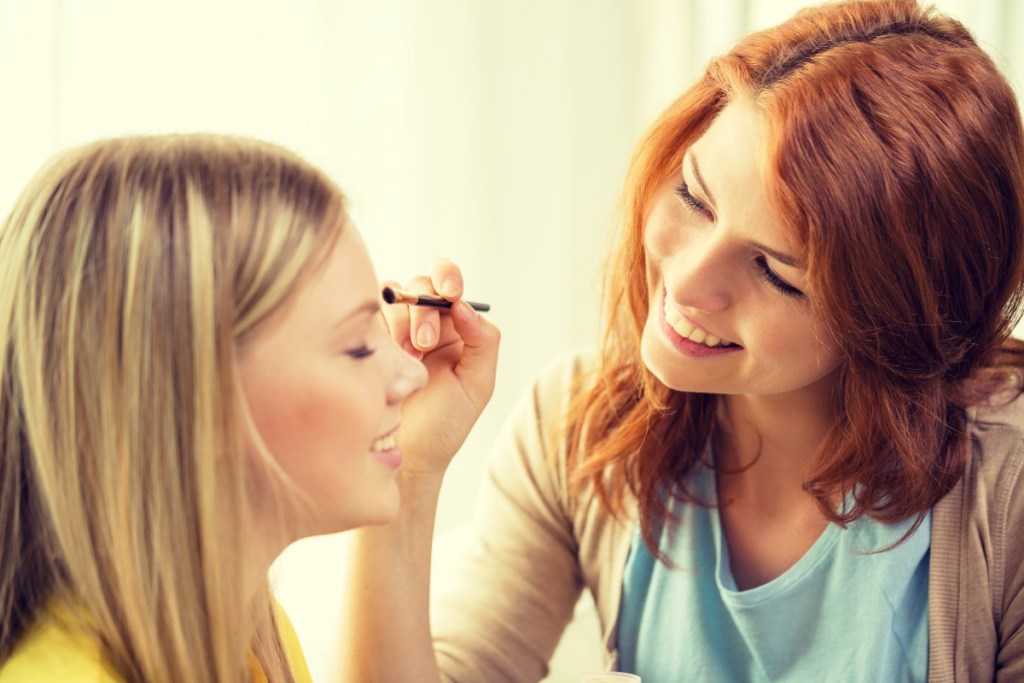You may be taken by surprise when, one day, your tween or teen is suddenly interested in wearing makeup. In your parental eyes, that little girl of yours is not ready for a bold red lip or a curling mascara, but — lo and behold — she may have other, more sophisticated ideas in mind.
This is all a part of growing up, and it’s your job to encourage your child’s creativity, boost their confidence, and help lead them on an age-appropriate path. It’s a tricky line to straddle, and you’ll want to balance playing the part of their bestie and being the responsible parent. So before you jump on your instinct to either ban all the makeup products or give in and buy palettes filled with glittery eye shadows, think through the repercussions and take these tips into consideration.

Understand your child’s motivation
How old should you be to wear makeup? This is a question with subjective answers — and there is no definitive right or wrong here. So, instead of setting a strict age restriction, ask a few more productive questions. Even if your child is on the younger side, you can use this opportunity to communicate openly. Why do they want to start wearing makeup? What is motivating this decision? Are their friends wearing makeup to school? Are they insecure about the sudden appearance of acne? Do they enjoy watching beauty tutorials on YouTube? This can help steer you both in the right direction and start a dialogue about inner beauty, aesthetics, confidence, and adolescence.
Start simple
Makeup for tweens can be super simple — and subtle. So, before you put up a fight, consider a few basic options. Some lightly tinted lip balm, a coat of clear mascara, and a hint of cheek color may be the compromise you’re both looking for. It is not a total transformation, but it’s a good beginner routine. Your makeup rookie will be excited to add some products into their daily repertoire, and you won’t have to worry — you kiddo will still look like your kiddo.
Shop together
Don’t want your child wearing blue eyeliner and neon eye shadow just yet — or, you know, ever? Go to the store with them and help gently guide them through the available options. If your child scoffs at your mild aesthetic, seek out the help of a professional. An employee at a department store makeup counter should be able to help you both find that happy medium. Let’s be honest, sometimes a teenager just wants to be treated like adult by someone who is not their primary caregiver.

Make it a bonding experience
Want to make this a sweet moment and a fun milestone? Give each other crazy makeovers. Raid your collection, and paint up those eyes, lips, and cheeks. Let your teen go a little wild with your look, but maybe go simple and understated with theirs. Show them that you know what you’re doing, and that you understand that — when it comes to makeup — less can be more. But don’t ruin their fun — let them pick out the craziest outfit for you, do your hair whatever way they please, and set up a whole photo-shoot session. It’s all in good fun.
Emphasize skin care
While you are slowly adding products to your tween or teen’s makeup arsenal, be sure to emphasize the importance of skin-care health and hygiene. If they think they’re old enough to wear makeup, then they need to be responsible about their skin. First, they need to remember to remove makeup at the end of the day. Cleansing, moisturizing, and using SPF should be a normal part of their daily routine.
What’s more, if they’re turning to makeup because of breakouts (hello, adolescence!), be sure they understand that, while some products can mask imperfections, they won’t get rid of them. Introduce better cleansers, targeted moisturizers, and gentle acne treatments to help them get through this potentially awkward phase. If your child’s confidence is really plummeting because of skin issues, take them to see a dermatologist. Over time, proper care will help them look and feel far better than any single makeup product can.
You want your tween or teen to turn to you for comfort, care, and consideration. You want their trust and their ear, so be willing to have the makeup conversation — even if you’re not willing to accept the fact that they are growing up quickly. A little makeup might help give them the boost they’re looking for. With your advice, encouragement, and steady mascara-wielding hand, you’ll be able to help them understand the basics, so they can more readily embrace their beauty — on the inside and out.


